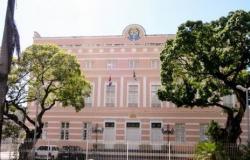The hearing this Monday (25) hosts a UFMG seminar that focused on research on the condition of teachers in the state network.
Image
In the context of neoliberalism in which Brazil is inserted, the work of teachers in the state education network of Minas Gerais has been marked by low remuneration and precariousness of the activity. This is evidenced by the increase in temporary contracts, the disrespect for the national minimum wage for teachers, the loss of labor and social security guarantees, leading the category to impoverishment and social deterioration.
These were the main findings presented during a public hearing of the Education, Science and Technology Commission of the Legislative Assembly of Minas Gerais, this Monday afternoon (25/3/24). Through the initiative of the president and vice-president of the commission, PT deputies Beatriz Cerqueira and Macaé Evaristo, the partnership between ALMG and UFMG allowed the meeting to host the International Education Research Seminar (Prodoc), held by the Faculty of Education at this university.
Button
With the central theme “The state of knowledge about the teaching status of teachers in the state education network of Minas Gerais”, the event brought together several researchers, who approached the issue from different perspectives. Dealing with the category’s remuneration, Nayara Macedo, professor of Higher Education at the Federal University of Viçosa (UFV), addressed the process of gradual loss of purchasing power for state teachers.
She recalled that, When the Government of Minas Gerais implemented the National Teachers’ Minimum, approved in 2008, it promoted substantial changes by creating the so-called subsidy, which ended bonuses. This scenario of salary loss generated discontent in the class, which felt devalued and unmotivated by the fact that the national minimum ended up becoming the ceiling for Minas Gerais teachers.
Designations
The researchers from Fundação João Pinheiro, guests of Prodoc, Marina Amorim and Ana Luíza Gomes discussed the employment relationships in force in state education. They highlighted that most teachers from Minas Gerais have been hired through the appointment system since 1990., contradicting the premises of the Federal Constitution. The Magna Carta adopts the competition as a paradigm for access to the public service and hiring is treated as an exception, for specific situations.
According to studies analyzed by both, In 2014, there were only 43% of teachers in the network, including 24.5% in the classroom, and the National Education Plan recommends 90% of permanent staff in education networks. The scientific works evaluated attempt to explain the motivations for the majority adoption by the government of Minas Gerais of the designation system.
Among the justifications for the government to adopt this logic, there is an economic one, as it is less expensive to hire in a precarious manner, with a lower salary (on average, 34% lower than that of permanent employees). As a sociological reason, research questions whether the origin of the neglect of public schools is related to the fact that this institution serves children from the poor class. In the management aspect, the designation appears to be strategic, allowing the government to exempt itself from planning for the sector, as it is easy to replace an employee with a contractor.
As the impact of the designation to the detriment of competitive hiring, the FJP teachers detected the lack of an educational career planmost of the benefits granted to employees: out of 33 rights in this group, the person appointed is entitled to only 10. Illness in the category is also higher among those designated, leading to longer leaves for this group.
The effect on the quality of teaching is also visible. Scientific work demonstrates that assignments for long periods have an impact on student performance. In the case of shorter, temporary replacements, the impact is much smaller on the educational result. The solution pointed out by Marina Amorim and Ana Gomes is to hold more public tenders, despite this coming up against limitations imposed by the Fiscal Responsibility Law.
Lack of career
In addition to the competition, another important motivational aspect – the career – was addressed by Alvanise Valente, from UFV. According to her, the career encourages people to prepare, acquiring the necessary training to carry out their profession. The researcher cited her own example to show how important her career at this university was for her to qualify to become a full professor. “And do people from the state network have these same conditions? No,” she stated, remembering that there are state standards that govern the careers of education personnel, but they are not implemented.
Policy discontinuity is notable in high school
João de Souza, professor of Sociology of Education at UFMG, cited how A striking feature in education is the discontinuity of public policies aimed at the sector. This factor, he states, generates, among other problems, insecurity in educational environments and precarious work, making teaching degrees unattractive.
The devaluation of teaching work is evident when one observes that teachers are assigned to schools located in vulnerable areas and to work at night. Allied to this, poor remuneration and the loss of the centrality of the teacher’s work lead to a low prestige of the profession. “There is a recurring discourse that we value education, but if we do not build a state policy to truly value teaching work, in 50 years we will be here talking about the same thing”, he acknowledged.
Maria Rita Oliveira, professor at UFMG, addressed the use of technologies in education. She recalled that in 1980, the first government project on information technology in education was created, with the participation of this university and four others. At UFMG, the inclusion of tools such as computers was discussed, but from a critical perspective on the use of technology.
Prodoc research coordinator, Júlio Pereira, presented data on Prodoc research as a whole. Funded by the State Research Support Foundation (Fapemig), in a 2017 notice, the work involved more than 50 researchers, directly or indirectly, who focused on research carried out between 2008 and 2018 about the condition of the teacher or about the situation of the state education network. Initially, there were 201 works and with the refinement of the research, it reached 158, including 141 dissertations and 17 theses. As a result, the group of researchers ultimately presented 15 analytical texts on the material studied.
Destruction of teaching
As a debater, professor at the Faculty of Education at UFMG Miguel Arroyo said that what caught his attention in every speech was project to destroy the teaching profession promoted by public authorities. And he questioned whether there were ways for teachers to talk about their history of self-construction, instead of just presenting the history of powers.
He further suggested that the insecurity and lack of recognition of teaching work may be related to the feminization of teaching, as women are the biggest victims of the withdrawal of rights. Arroyo also raises the possibility of marginalization of public schools is also a consequence of racism, since only black and mixed-race students study there and the number of black teachers increases proportionally. “White people are mostly in private schools, which is a racist form of dehumanization; if black students are segregated, so will teachers; It’s proof that we don’t have, and never have had, just one teaching profession,” she concluded.
Tags: pay precariousness mark teaching work
--





